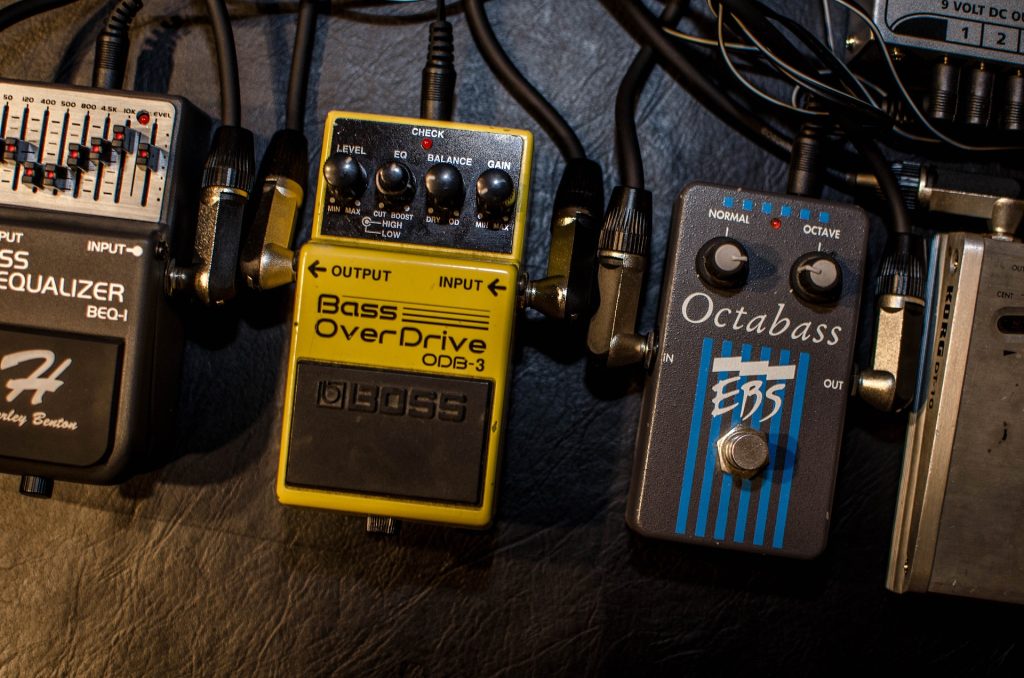(This article comes from our friends at GuitarTricks.com – check out their site for tons of guitar-related tips and tricks!!)
How Can Pedals Improve Your Guitar Playing?
By Shawn Leonhardt for Guitar Tricks and 30 Day Singer, the original platform for online guitar lessons.
Many guitarists use effects and pedals for emulating the playing of other songs. Whether it is just bedroom practice, beginner guitar lessons, or on-stage performance it is common to search for a tone already used. But our pedals and effects are really an extension of the instrument, and if used correctly they allow us to improve our guitar playing and general musical creativity.
How Pedals Will Not Improve Your Playing
While we will mainly discuss how pedals can improve your playing, we first need to deal with the reality of guitar effects. Pedals are often used to mask terrible guitar skill. The amount of distortion, overdrive, and time-based effects used by some artists simply muddy up the water and make it hard to tell if it really sounds good!
And except for noise music genres, even the heaviest metals and fusion styles need to have solid playing behind all the fanfare. Always be sure to practice acoustically or with clean tones to know that your technique and playing is done properly. Don’t forget your guitar scales and barre chords practice! Do not rely on your pedals to get around being a better guitarist.
Otherwise guitar pedals are awesome and can make the instrument do incredible things. If you have a lot of guitar effects pedals you are essentially like a painter with a huge collection of colors. Like the painter though you need to know how to use those colors, and once you do you can create some great art!
Ways to Use Pedals and Effects to Improve Your Playing
Below we will group pedals into their basic categories, but always remember that they can be used beyond what the normal settings are. And there is so much pedal mixing and matching to be done, that huge varieties of sound can be created. The main aspect of pedal improved playing is through creativity, so think beyond categories and out of boxes to get the most benefit out of them.
Overdrive
This normally helps increase our signal and can give it that old fashion analog tube gain. Normally we want this tone for blues inspired genres that need an overdriven guitar signal, but we can also use it in practice as a reverse of the above. After practicing clean, turn the overdrive or even a boost pedal up, and see how you sound with more volume and grit!
Distortion
The same can be done with distortion, fuzz, and other signal gains, notice as it gets more distorted more sounds are created through overtones. Now in some cases, that clean playing does not sound good depending on what chord or notes we used. Therefore power chords are so popular in punk and metal because they create overtones and distortion that is not harsh. Experiment creatively with different intervals, chords, and speed on distortion pedals to see how far you can go before it sounds bad.
Reverb
Reverb allows us to shape the acoustic space our guitar is in, so the amount of creativity is as endless as the space echo itself! And even though there have been a variety of popular reverbs like spring, plate, and digital they all usually offer similar effects. Any reverb will improve your playing by giving you more depth, take advantage of that to shape the sonic space you are in. It’s a wonderful way to build slower melodies and riffs because simple intervals suddenly sound different.
Delay
Turn the reverb up enough and you will get delays and echos that can be used as melodies and rhythms. Many guitarists love to turn dotted eighth notes or another time on and just let the machine do the playing for them! But be careful, like distortion, in delay the notes will bounce off one another and can go from sounding cool and rhythmic to terrible and off. Study which riffs and melodies work in delay and those that do not.
Modulators
These are the group of pedals that alter the guitar signal and are often named after the sound effect they provide like chorus, phaser, tremolo, vibrato, ring modulator, and flangers. These pedals will not necessarily help improve your physical skill, but they will be very important to the creative side of music. These are some of the most fun pedals to experiment and play with. Like synthesizers these pedals are knob turners, many guitarists can fiddle around all day long with modulation.
Pitch and Volume Shifters
A variety of pedals fall into these categories and can help improve our guitar playing in a few ways. Pitch shifters and harmonizers help us with our music theory! When you want to get beyond simple riffs, intervals, and melodies these pedals allow us to focus on new harmonies and added tones. And pedals like a wah-wah will help improve our rhythm as we need to move our foot in time with our strum.
Loopers
Any kind of recording device will be your best buy to improve your guitar playing, especially one that allows looping. These pedals allow you to practice with yourself as if you are a band. They can help you learn drum rhythms, bass lines, and of course lead and rhythm guitar! The best way to use a looper is to first read the instructions and then go crazy, these are tools for creativity. Play along with just yourself and see what sounds good and what doesn’t!
Compressors and Equalizers
These involve shaping and changing the guitar signal to control or filter different frequencies in your final sound. They will not necessarily help with actual playing, but they will help guide you in the basics of mixing. When playing with these pedals creative trial and error are fine, but make sure to study what is happening.
If you understand the adjustments of the low, middle, and high frequencies that you are making, it will give you a better grasp on the concept of the guitar tone. And of course in some situations these pedals are used in creative ways. The very foundations of modern pop, rock, and dance, have all heavily been influenced by modern dynamic compression.
If you are keeping a focus on proper practice and technique, guitar pedals will always help with improving your sound and playing. Always be sure to learn the basics, stick with any beginner guitar techniques you need to master, and learn the common uses of each pedal or effect, and then start experimenting. Guitar pedals essentially provide you with a new instrument and any sonic space you can create, it is no wonder they are so addictive.
Shawn Leonhardt is a writer for Guitar Tricks, a platform for online guitar lessons with over 4 million subscribers.
________________________
GET EXCLUSIVE UPDATES, CONTEST INFO, SEE OUR LATEST DEMO VIDEOS AND MORE:
















